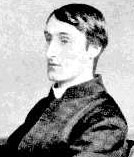Thou Art Indeed Just, Lord, If I Contend Poem by Gerard Manley Hopkins
Thou Art Indeed Just, Lord, If I Contend
Justus quidem tu es, Domine, si disputem tecum:
verumtamen justa loquar ad te:
Quare via impiorum prosperatur? &c.
Thou art indeed just, Lord, if I contend
With thee; but, sir, so what I plead is just.
Why do sinners' ways prosper? and why must
Disappointment all I endeavour end?
Wert thou my enemy, O thou my friend,
How wouldst thou worse, I wonder, than thou dost
Defeat, thwart me? Oh, the sots and thralls of lust
Do in spare hours more thrive than I that spend,
Sir, life upon thy cause. See, banks and brakes
Now leavèd how thick! lacèd they are again
With fretty chervil, look, and fresh wind shakes
Them; birds build -- but not I build; no, but strain,
Time's eunuch, and not breed one work that wakes.
Mine, O thou lord of life, send my roots rain.
a lamenting little piece by hopkins as he battles with his faith- he lives the live, 'upon thy cause' but indeed, 'why do sinners' ways prosper'; there is inherent disappointment for him; as God's servant, why does he not benefit- even nature does better than he who 'not breed one work that wakes'. but there is very little blame on God, if any at all; there is instead respect and subservience, 'sir', he calls God throughout the play, and in the end, he asks God for strength- 'send my roots rain'. the 14 line sonnet is indicative of a prayer form, especially with the reference and direct mention of 'Lord' in the first line. the rhyming scheme adds to this effect, like hymns or prayer in the church.
This poem has not been translated into any other language yet.
I would like to translate this poem
A deceptively simple but actually very clever poem. It starts with a statement - that God is just - that is quickly revealed as a bit of flattery the rest of the poem disputes. The priest-poet becomes irate as he details God's failures with respect to him, and generosity to all others, who breed riotously, while the forsaken poet cannot 'breed one work that wakes.' The great joke of the poem is that it is itself a 'work that wakes.' It is both a prayer ('Send my roots rain! ') and the answer to the prayer. It purports to dispute God's justice but ends up as proof of that justice. It stands as the refutation of its own thesis (that sinners' ways prosper but disappointment all I endeavor ends) , and ends up giving proof to the insincere flattery of the opening. Brilliant and funny.